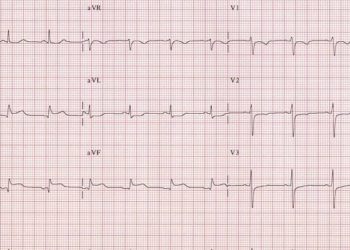Ivonescimab improves survival in advanced non-small cell lung cancer
1. Patients in the ivonescimab group demonstrated a significantly greater progression-free survival than those in the pembrolizumab group.
2. Grade 3 or greater treatment-related adverse events were more common in ivonescimab.
Evidence Rating Level: 1 (Excellent)
Study Rundown: Ivonescimab is a bispecific antibody targeting programmed cell death ligand-1 (PD-L1) and vascular endothelial growth factor (VEGF), showing promising results in early trials for advanced non-small cell lung cancer (NSCLC). Pembrolizumab, another PD-1 inhibitor, is a standard first-line treatment for PD-L1-positive NSCLC. This randomized controlled trial aimed to compare the efficacy and safety of ivonescimab versus pembrolizumab in patients with PD-L1-positive advanced NSCLC. The primary outcome of this study was progression-free survival (PFS), while a key secondary outcome was the safety profile of ivonescimab compared to pembrolizumab. According to study results, ivonescimab significantly improved median progression-free survival and showed consistent benefit across different PD-L1 expression subgroups. Although this study was well done, it was limited by the fact that the final analysis is still pending, which may affect the interpretation of long-term outcomes.
Click to read the study in The Lancet
Relevant Reading: Pembrolizumab versus Chemotherapy for PD-L1–Positive Non–Small-Cell Lung Cancer
In-depth [randomized controlled trial]: Between Nov 9, 2022, and Aug 26, 2023, 879 patients were assessed for eligibility across 55 hospitals in China. Included were patients ≥ 18 years with locally advanced or metastatic PD-L1 NSCLC and an ECOG performance status of 0 or 1. Altogether, 398 patients (198 in ivonescimab and 200 in pembrolizumab) were included in the final analysis. The primary outcome of PFS was significantly longer with ivonescimab than with pembrolizumab (11.1 vs. 5.8 months, hazard ratio [HR] 0.51, 95% confidence interval [CI] 0.38–0.69]; p<0.001). The secondary outcome of ≥ grade 3 treatment-related adverse events was more frequent with ivonescimab (29%) than with pembrolizumab (16%), though immune-related adverse events were comparable between the two groups. Overall, findings from this study suggest that ivonescimab may offer a more effective first-line treatment option than pembrolizumab for PD-L1-positive advanced NSCLC.
Image: PD
©2025 2 Minute Medicine, Inc. All rights reserved. No works may be reproduced without expressed written consent from 2 Minute Medicine, Inc. Inquire about licensing here. No article should be construed as medical advice and is not intended as such by the authors or by 2 Minute Medicine, Inc.

![2 Minute Medicine: Pharma Roundup: Price Hikes, Breakthrough Approvals, Legal Showdowns, Biotech Expansion, and Europe’s Pricing Debate [May 12nd, 2025]](https://www.2minutemedicine.com/wp-content/uploads/2025/05/ChatGPT-Image-May-12-2025-at-10_22_23-AM-350x250.png)







